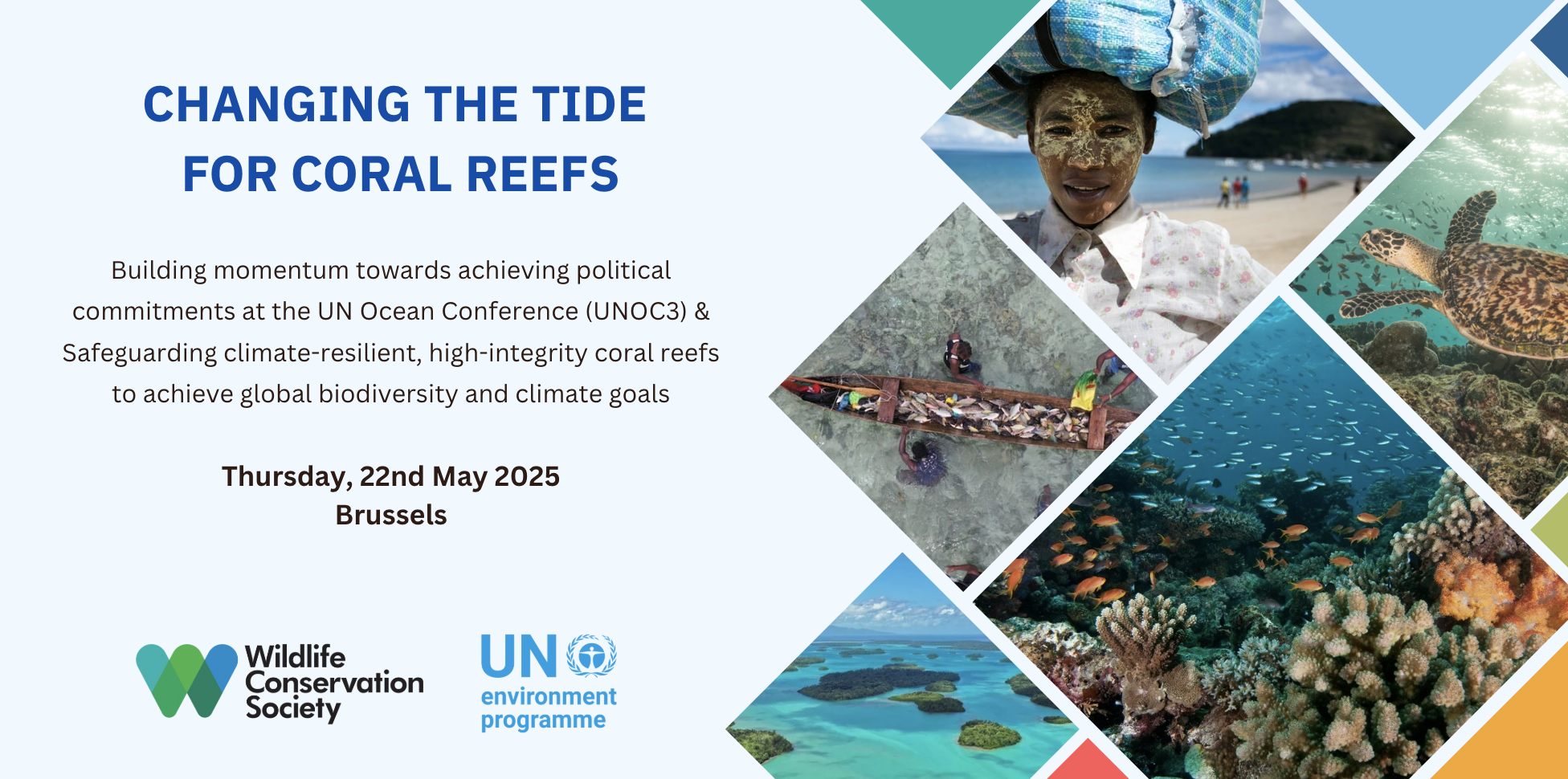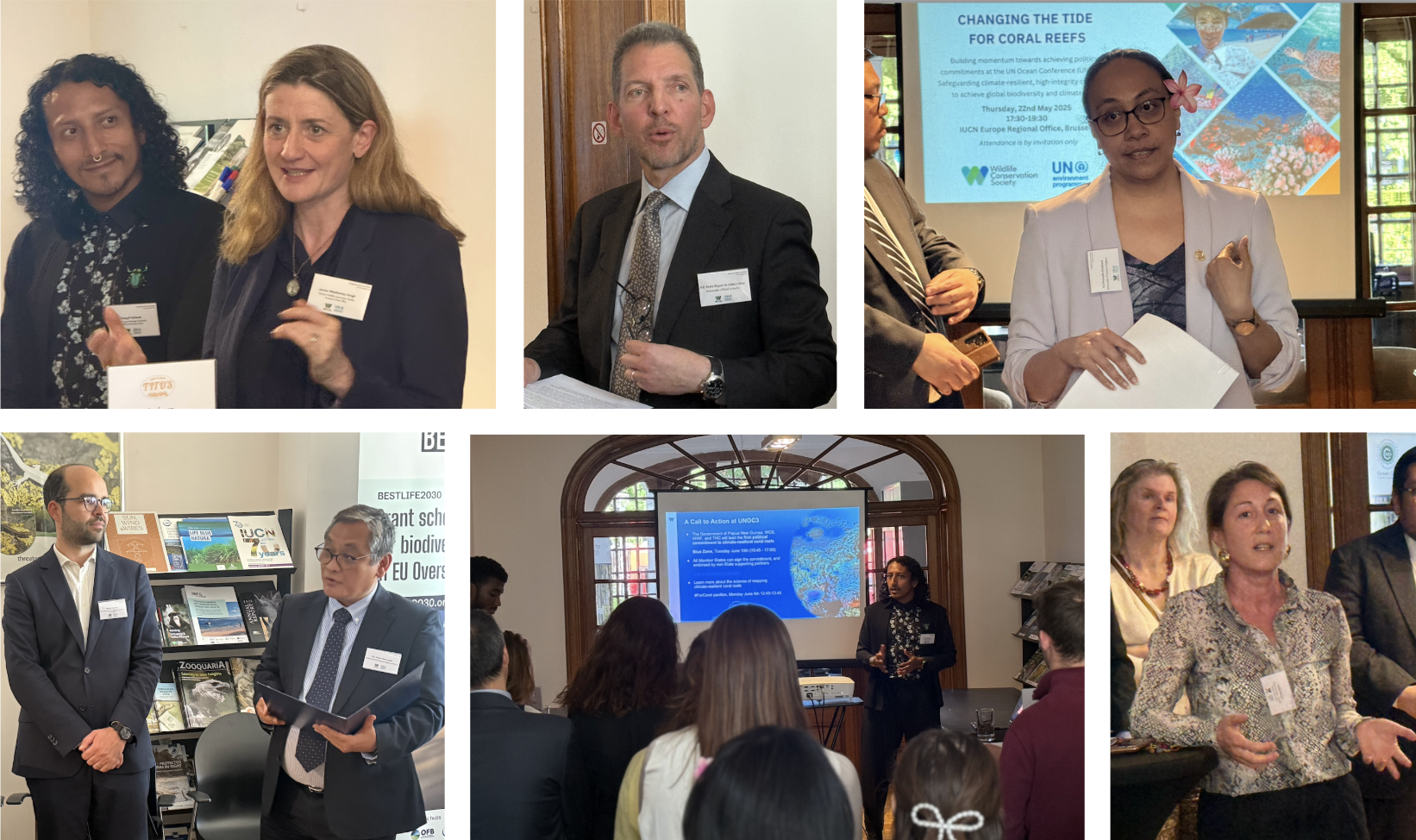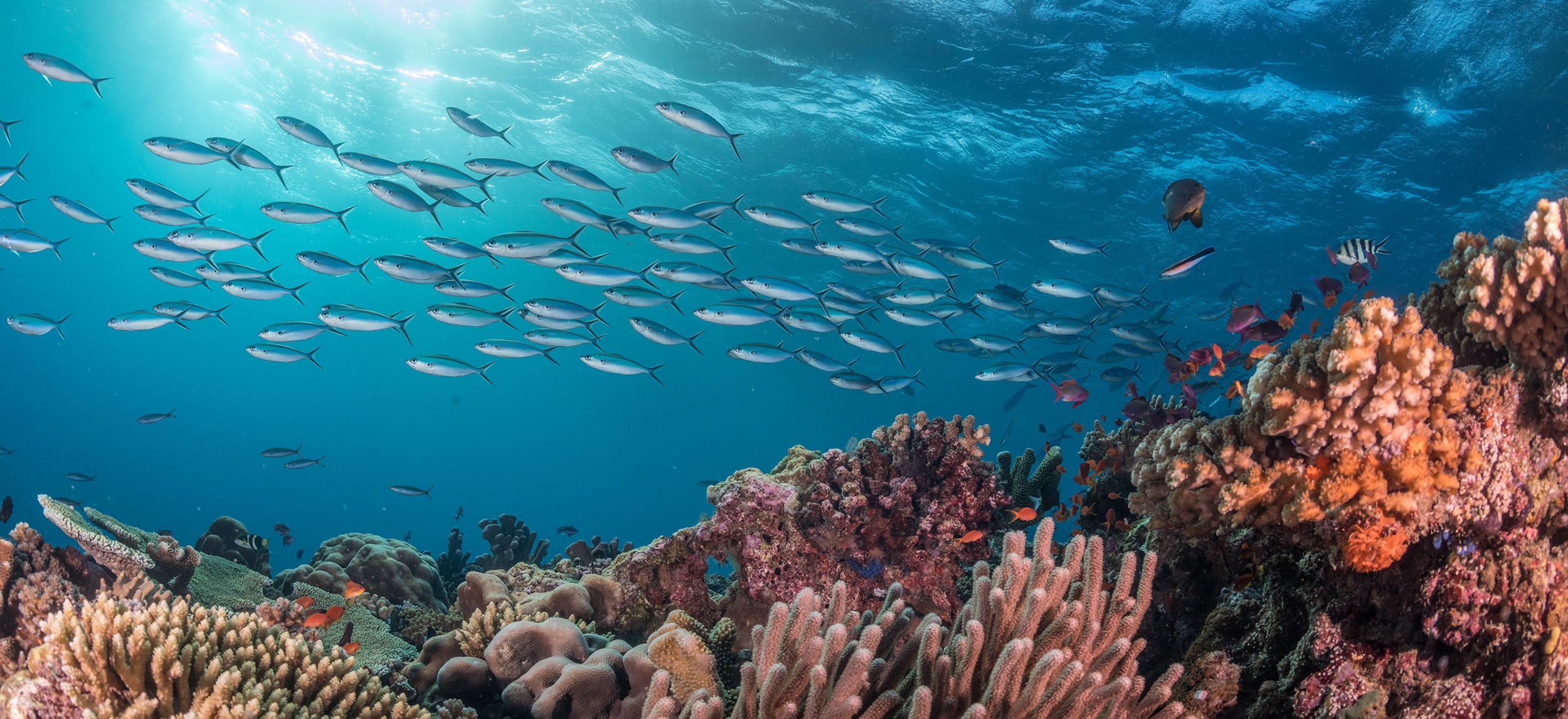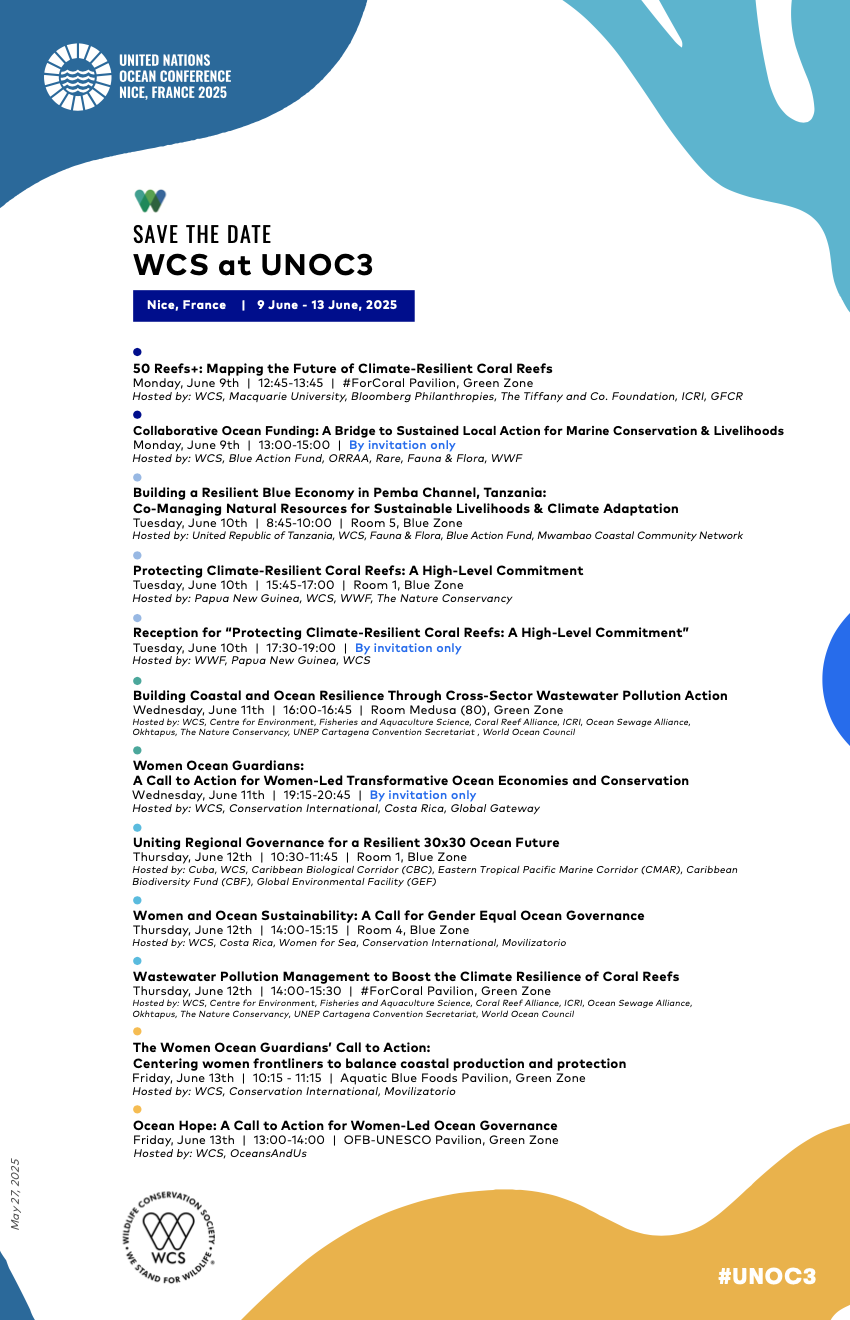
Changing the Tide for Coral Reefs in the Run-Up to UNOC3
In the run-up to the third United Nations Ocean Conference (UNOC3) taking place in Nice in June, the Wildlife Conservation Society EU Office (WCS EU) and UN Environment Programme (UNEP) hosted a high-level event on 22nd May in Brussels to build momentum towards achieving political commitments at UNOC3 that contribute to safeguarding climate-resilient, high-integrity coral reefs for achieving global biodiversity, climate, and sustainable development goals.
It was an invaluable opportunity for policymakers and key stakeholders working on biodiversity and climate to discuss the importance of coral reef ecosystems and to hear from Global South countries, including Brazil, Samoa, and the Philippines; UNEP; WCS; and the European Commission.
 Speakers and participants at the pre-UNOC event in Brussels
Speakers and participants at the pre-UNOC event in Brussels
Check out the highlights from our distinguished speakers:
Dr. Janice Weatherley-Singh, Director of the Wildlife Conservation Society EU Office, opened the event and welcomed the participants. She stressed that coral reefs are among the most biodiverse ecosystems on the planet, essential for the overall health and resilience of marine and coastal ecosystems. Identifying, conserving, and monitoring climate-resilient coral reefs is a key priority to ensure a global network of high-integrity coral reefs and help countries achieve the commitments made under the Kunming-Montreal Global Biodiversity Framework (KM-GBF). Dr. Weatherley-Singh emphasised that WCS, together with its partners, has identified several strategic countries with the potential to significantly advance global coral reef conservation—provided they commit to and effectively implement national plans and policies aimed at protecting climate-resilient coral reefs. She thanked the EU for their support for WCS’s work in the Coral Triangle, an area where the coral reef ecosystem hosts exceptional biodiversity and is essential to the livelihoods and food security of 120 million people.
Nicolas Galudec, Senior Policy Advisor at the UNEP Brussels Office, reiterated the critical importance to enhance political attention towards the multiple issues affecting Oceans, from pollution to ecosystems degradation and climate change - and to the solutions that can be formulated to address those critical issues. Coral reefs, which play a key role in sustaining the health and resilience of marine and coastal ecosystems for many countries and regions in the world, must be part of these discussions. Climate change continues to warm oceans and seas, triggering widespread coral bleaching. Since 2023, over 80 % of the world’s coral reefs have experienced bleaching conditions. Mr. Galudec further highlighted that the mobilization of additional financial resources for the conservation and restoration of coral reefs will be essential to achieving lasting impact at UNOC-3. Backed by a strong UNEA mandate with Resolution 4/13 on the sustainable management of coral reefs, UNEP is addressing this crisis affecting coral reefs through science, finance, and partnerships. It co-leads the Global Fund for Coral Reefs (GFCR), a blended finance mechanism supporting reef-positive solutions across 20+ countries.
Diwigdi Valiente, Senior Program Manager for Coral Reefs at WCS, highlighted how climate-resilient coral reefs can help safeguard biodiversity, food security, and local economies to 2030. Located in ocean ‘cool spots’ — areas more likely to survive and/or recover from marine heatwaves and coral bleaching — these reefs are a critical priority for the well-being of one billion people, many of whom live in Small Island Developing States and coastal nations. The WCS Coral Reef Program, operating across 18 countries, is working to identify, monitor, and protect these reefs through a portfolio approach that includes reefs that avoid, resist, or recover from climate stress. Diwi further emphasized that science must be matched with political will and equitable action. That’s why WCS, WWF, TNC, and the Government of Papua New Guinea are launching the first high-level political commitment to protect climate-resilient coral reefs at UNOC3. This commitment is open to all countries and aims to elevate coral reef resilience as a global priority for climate, biodiversity, and community well-being. Learn more here: https://www.wcs.org/coralcommitment. Diwi closed by calling for more strategic partnerships and investment in local leadership, monitoring, and implementation.
 Photo credit: ©Daryl McDonald / WCS
Photo credit: ©Daryl McDonald / WCS
H.E. Pedro Miguel da Costa e Silva, Ambassador of Brazil to the EU, stressed that, as the host of UNFCCC COP30 in 2025, Brazil comes to UNOC3 with the intention of aligning ocean action with the broader climate agenda. Brazil fully recognizes the ocean’s critical role in regulating the global climate and aims to strengthen the synergies between the UN Ocean Conference and the UNFCCC process, ensuring that ocean health is firmly embedded at the heart of climate negotiations. Ambassador da Costa e Silva noted that multilateralism is a pillar of Brazil’s approach. As a country with an extensive coastline and rich marine ecosystems - including vital coral reefs that sustain biodiversity and enhance coastal resilience - Brazil believes that coordinated international cooperation, adequate financing, and strengthened capacity-building, especially for developing nations, are essential to address shared marine challenges. He added that, in this context, the early entry into force of the Agreement on the Conservation and Sustainable Use of Marine Biological Diversity in Areas Beyond National Jurisdiction (BBNJ Agreement) is vital. In closing, Ambassador da Costa e Silva highlighted the importance of traditional knowledge and active community participation in fostering inclusive, community-based approaches to ocean conservation.
H.E. Jaime Victor Ledda, Ambassador of the Philippines to Belgium and the EU, emphasized the Philippines’ deep commitment to marine conservation, noting the country's unique position as an archipelagic state at the heart of the Coral Triangle. As a founding member of the Coral Triangle Initiative on Coral Reefs, Fisheries, and Food Security (CTI-CFF), the Philippines has long championed regional marine governance. He underlined that the country’s coastal and marine ecosystems are not only ecologically vital but also central to the livelihoods and food security of millions of Filipinos. Ambassador Ledda explained that the protection of these ecosystems is a national priority, essential for climate adaptation, disaster risk reduction, and sustainable development. He also shared that in preparation for UNOC3, national stakeholder consultations were held in November 2024 to shape the Philippines’ Voluntary Commitments. These will focus on: Marine and Coastal Ecosystem Conservation and Pollution; Ocean-Climate-Biodiversity Nexus; Sustainable Fisheries and Artisanal Livelihoods; and Sustainable Ocean-Based Economies. In closing, Ambassador Ledda highlighted that the Philippines was among the first signatories to the UN High Seas Biodiversity Treaty and is deeply engaged in the implementation of the UN Decade of Ocean Science for Sustainable Development.
 Photo credit: © Tom Vierus/WCS
Photo credit: © Tom Vierus/WCS
H.E. Francella Strickland, Ambassador of Samoa to Belgium and the EU, pointed out that Samoa is a large ocean state from the Blue Pacific, with the ocean comprising 98 % of its territory. “We cherish our special relationship with the ocean as we are the ocean; the ocean is in us”, she added. Cognizant of the threats that such demands and pressures place on these critical resources, Samoa launched the Samoa Ocean Strategy (SOS) in 2020, our national policy framework that seeks to sustainably manage Samoa’s vast ocean and marine resources. The Strategy provides comprehensive integrated ocean management solutions to advance ocean stewardship and ensure that cultural and economic values that Samoans derive from the ocean continue to be available to all generations. This includes the goal that by 2030, monitoring and enforcement are strengthened in order to effectively protect our coral reefs from bleaching, acidification and natural disasters. At the upcoming UNOC3, Samoa will continue to call for the urgent and effective implementation of SDG 14, which sadly, is by far the least funded SDG. Ambassador Strickland highlighted that Samoa will call for more investment in oceans, stronger governance frameworks, astute political leadership, urgent ratification of the BBNJ, and an ambitious treaty on plastic pollution. Samoa will highlight the Apia Commonwealth Ocean declaration, with 56 members standing in solidarity with SIDS and Pacific in relation to safeguarding the permanency of maritime zones and our homes against the unprecedented impacts of sea level rise.
Nadia Deckert, Ocean Policy Expert, DG International Partnerships, European Commission, highlighted the EU’s strong commitment to delivering tangible results at UNOC3. She underlined that while the EU has actively championed an ambitious and action-oriented UNOC3 Political Declaration, such a declaration alone will not suffice. The EU is determined to follow through with concrete deliverables, focusing on three key priorities. First, the EU is moving swiftly to ratify and implement the BBNJ Agreement, with the ratification instrument to be deposited by the end of May. The EU is also relaunching the High Ambition Coalition and supporting developing countries through the first contract under a new Global Ocean programme focused on Areas Beyond National Jurisdiction (ABNJ). Second, the EU will promote a stronger science-policy interface through an International Platform on Ocean Sustainability (IPOS). Third, advancing digital ocean systems and information services will be a priority. An EU Digital Ocean Pavilion will serve as a platform to showcase cutting-edge innovations and announce two new programmes designed to enhance ocean monitoring and forecasting capabilities in Africa and Costa Rica. In closing, Ms. Deckert stressed the importance of maintaining EU leadership on ocean governance in the face of global uncertainty and the need to demonstrate that multilateral cooperation can drive meaningful ocean action.
We look forward to continuing the conversation at UNOC3 and working together to drive impactful marine conservation and ocean governance.
Check out the WCS events during UNOC3:
